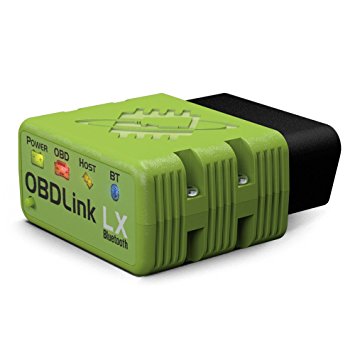Difference between revisions of "OBDLink LX"
Jump to navigation
Jump to search
| Line 1: | Line 1: | ||
| + | __NOTOC__ | ||
[[File:OBDLinkLX .jpg|400px]] | [[File:OBDLinkLX .jpg|400px]] | ||
| + | Connection: Bluetooth | ||
= Identification = | = Identification = | ||
<source lang='bash'> | <source lang='bash'> | ||
| Line 16: | Line 18: | ||
13.4V | 13.4V | ||
</source> | </source> | ||
| − | = Connecting to an OBDLink LX from Linux = | + | = Usage = |
| + | |||
| + | == Connecting to an OBDLink LX from Linux == | ||
the following was tested on a Raspberry PI | the following was tested on a Raspberry PI | ||
| − | == Bluetooth pairing with bluetoothctl == | + | === Bluetooth pairing with bluetoothctl === |
<source lang='bash'> | <source lang='bash'> | ||
bluetoothctl | bluetoothctl | ||
| Line 43: | Line 47: | ||
</source> | </source> | ||
| − | == Setting up an rfcomm device == | + | === Setting up an rfcomm device === |
<source lang='bash'> | <source lang='bash'> | ||
sudo rfcomm bind rfcomm0 00:04:3E:9F:A3:C0 | sudo rfcomm bind rfcomm0 00:04:3E:9F:A3:C0 | ||
| Line 50: | Line 54: | ||
</source> | </source> | ||
| − | == Testing == | + | === Testing === |
<source lang='bash'> | <source lang='bash'> | ||
minicom -D /dev/rfcomm0 115200 | minicom -D /dev/rfcomm0 115200 | ||
</source> | </source> | ||
| − | == Testing with a python script == | + | === Testing with a python script === |
<source lang='bash'> | <source lang='bash'> | ||
python3 source/java/can4eve/scripts/obdtest.py | python3 source/java/can4eve/scripts/obdtest.py | ||
| Line 84: | Line 88: | ||
</source> | </source> | ||
| − | == Forwarding the OBDII Adapter via TCP/IP == | + | === Forwarding the OBDII Adapter via TCP/IP === |
<source lang='bash'> | <source lang='bash'> | ||
python source/java/can4eve/scripts/tcp_serial_redirect.py --debug -P 7000 /dev/rfcomm0 115200 | python source/java/can4eve/scripts/tcp_serial_redirect.py --debug -P 7000 /dev/rfcomm0 115200 | ||
Revision as of 06:42, 23 June 2017
Identification
>AT I
ELM327 v1.3a
>AT @1
SCANTOOL.NET LLC
>STDI
OBDLink LX BT r1.2
>STI
STN1155 v4.0.0
>AT RV
13.4V
Usage
Connecting to an OBDLink LX from Linux
the following was tested on a Raspberry PI
Bluetooth pairing with bluetoothctl
bluetoothctl
agent on
scan on
Discovery started
...
[NEW] Device 00:04:3E:9F:A3:C0 OBDLink LX
pair 00:04:3E:9F:A3:C0
Attempting to pair with 00:04:3E:9F:A3:C0
[CHG] Device 00:04:3E:9F:A3:C0 Class: 0x020300
[CHG] Device 00:04:3E:9F:A3:C0 Icon: network-wireless
[CHG] Device 00:04:3E:9F:A3:C0 Connected: yes
Request confirmation
[agent] Confirm passkey 559460 (yes/no): yes
[CHG] Device 00:04:3E:9F:A3:C0 UUIDs:
00001101-0000-1000-8000-00805f9b34fb
[CHG] Device 00:04:3E:9F:A3:C0 Paired: yes
Pairing successful
[CHG] Device 00:04:3E:9F:A3:C0 Trusted: yes
Changing 00:04:3E:9F:A3:C0 trust succeeded
quit
Setting up an rfcomm device
sudo rfcomm bind rfcomm0 00:04:3E:9F:A3:C0
ls -l /dev/rfcomm0
crw-rw---- 1 root dialout 216, 0 Jun 21 21:41 /dev/rfcomm0
Testing
minicom -D /dev/rfcomm0 115200
Testing with a python script
python3 source/java/can4eve/scripts/obdtest.py
>K
>LM327 v1.3a
>KE0
OK
>
ELM327 v1.3a
>
OK
>
ISO 15765-4 (CAN 11/500)
>
OK
>
OK
>
OK
>
Forwarding the OBDII Adapter via TCP/IP
python source/java/can4eve/scripts/tcp_serial_redirect.py --debug -P 7000 /dev/rfcomm0 115200
--- TCP/IP to Serial redirect on /dev/rfcomm0 115200,8,N,1 ---
--- type Ctrl-C / BREAK to quit
Waiting for connection on 7000...
At this point your OBDLink LX is available via LAN - you can simply do a telnet host 7000 to the server where you ran the commands. The can4eve software can now use the bluetooth device as if it was a Wifi/LAN device
